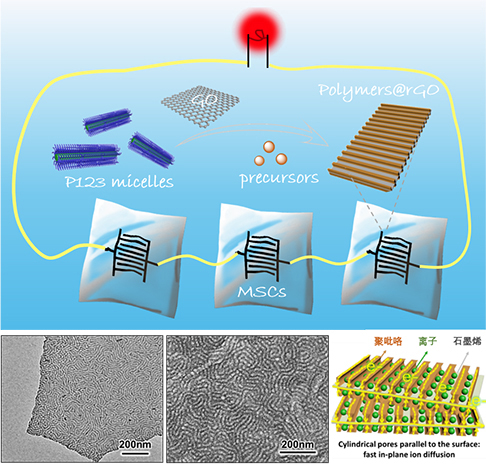[ Instrument Network Instrument Development ] Recently, the Dalian Institute of Chemical Physics of the Chinese Academy of Sciences 2D Materials and Energy Devices Innovation Special Zone Research Group (DNL21T3) Wu Zhongshuai research team and Shanghai Jiaotong University Professor Mai Yiyong team developed a common interface Self-assembly strategy, a series of in-plane parallel columnar ordered mesoporous polymer/graphene composite nanosheets were prepared and applied to planar micro-supercapacitors. The related results were published in German Applied Chemistry (Angew. Chem.). Int. Ed.).

Two-dimensional materials, such as graphene, are a class of planar micro-supercapacitor electrode materials with important application prospects. The development of two-dimensional material-based composite mesoporous nanosheets can not only effectively inhibit the stacking of the sheets, increase the specific surface area, but also greatly buffer the volume expansion of the electrodes and improve the diffusion and electrochemical properties of the electrolyte ions. However, it is currently reported that the mesoporous nanosheets with in-plane vertical columnar shape, and the controllable preparation of the in-plane parallel columnar ordered mesoporous nanosheets still face great challenges.
The research team developed a universal interface self-assembly strategy to prepare a variety of in-plane parallel columnar ordered mesoporous polymer/graphene composite nanosheets, including polypyrrole/graphene, polyaniline/graphene, Polydopamine/graphene is applied to all-solid planar micro-supercapacitors. These nanosheets have in-plane parallel columnar ordered mesopores, 11-12 nm in size and 25-27 nm thick, combined with the advantages of highly electrochemically active tantalum capacitor polymers and highly conductive dual layer graphene. . The micro-supercapacitors obtained in this work exhibit high volumetric specific capacity and energy density, while also providing excellent mechanical flexibility and series-parallel integration. This work provides a new idea for the control of ordered mesoporous materials in parallel two-dimensional planes, and provides a new strategy for designing and assembling high-power micro-capacitors.
The above work has been funded by the National Natural Science Foundation of China and the National Key Research and Development Program.
(Original title: New progress in the research of two-dimensional ordered mesoporous materials applied to micro-supercapacitors)
Aluminum castings are lightweight and able to withstand the highest operating temperatures of all die cast alloys.
Aluminum Alloy Characteristics:
- High operating temperatures
- Outstanding corrosion resistance
- Lightweight
- Very good strength and hardness
- Good stiffness and strength-to-weight ratio
- Excellent EMI and RFI shielding properties
- Excellent thermal conductivity
- High electrical conductivity
- Good finishing characteristics
- Fully recyclability
Aluminum's strength, corrosion resistance, and heat dissipating properties offer mechanical designers significant advantages. And our proprietary Thin Wall Aluminum Technology has made aluminum die casting an option for even more applications.
Aluminum Alloy Casting,Aluminum Precision Casting,Aluminum Alloy Die Casting Parts,Aluminum Alloy Die Casting
HSI INDUSTRIEL LTD , https://www.hsiindustriel.com